
At a Glance:
Is Your Refrigerator Causing Food Spoilage?
7 Refrigerator Replacement Recommendations
Have you ever wondered, "Why is my fridge spoiling my food?" Food spoilage is a significant problem that impacts countless homes across the country on a regular basis. When perishable foods like meat, seafood, produce, and dairy products become spoiled, it renders them unsuitable for consumption and can even cause illnesses if ingested.
Issues can arise with refrigerators that prevent them from effectively inhibiting spoilage. This article will explore the root causes that enable bacterial growth and lead to food decay. We will identify common refrigerator problems like improper temperature control, door seal deterioration, and airflow blockages that allow spoilage to occur more readily. Practical tips will also be shared for organizing, monitoring, and preserving perishables with regular maintenance and care of your refrigerator.
Discover Refrigerators from Arnold's Appliance
Is your refrigerator causing your food to spoil? Explore replacements from top brands like Frigidaire, Bosch, Signature Kitchen Suite, and more at Arnold's, today!
Shop RefrigeratorsUnderstanding Food Spoilage
Spoilage occurs as a natural process when microorganisms like bacteria, yeast, and mold are able to colonize foods, multiply, and proliferate either because the foods have not been properly stored at cold enough temperatures, or they have been left for prolonged periods within the "danger zone" between 40-140°F where bacterial growth is optimal.
A refrigerator delays the spoilage of food by consistently keeping interior compartments below 40°F. At these low, cool temperatures, the growth and multiplication of the microorganisms that cause food to decay, such as bacteria, yeast, and mold, is significantly slowed. This prolongs the shelf life of refrigerated foods and keeps them safe to consume longer.
However, if a refrigerator is not properly maintained and internal temperatures are allowed to rise above 40°F, these microbes can thrive much more rapidly. When refrigerator temperatures exceed the “danger zone” of 40°F, bacteria multiply at an accelerated pace on any foods stored inside.
Some common signs that food has spoiled include changes in odor, texture, and appearance like sliminess, soft/mealy textures, or new colors/molds growing. When in doubt, it's best to throw foods out rather than risk eating something that could cause foodborne illness.
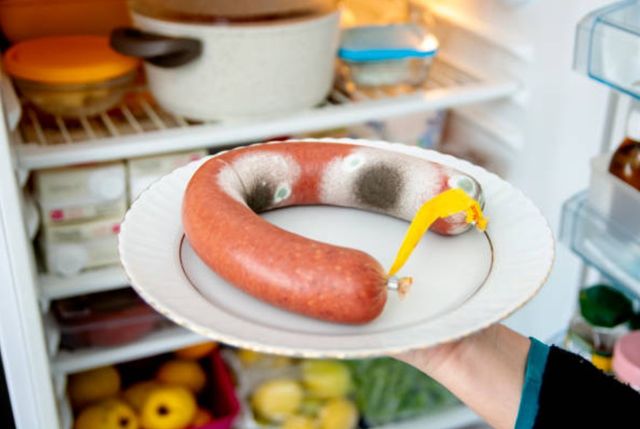
Foods that have spoiled can become unsafe to consume as the bacteria and toxins produced may cause illness if ingested, depending on one's health status. Symptoms from eating spoiled foods range from mild nausea to life-threatening complications in at-risk populations like infants, elderly or immunocompromised individuals. It is therefore crucial that refrigerators are regularly cleaned, have their temperatures monitored, and are kept at optimal performance to inhibit this issue.
What Causes Food Spoilage
So what makes food spoil in the refrigerator? There are a few key factors that contribute to food spoilage:
➤ Bacteria, mold, and yeast growth: These microorganisms are present everywhere and are the primary cause of food spoilage. They need moisture, appropriate temperatures, and food nutrients to grow and multiply quickly.
➤ Temperature: Bacteria multiply fastest between the temperatures of 40-140°F, which is why refrigeration is so important. Most refrigerators should be set to no higher than 40°F.
➤ Time: The longer food spends in the danger zone temperatures of 40-140°F, the more opportunity there is for bacteria to grow.
➤ Oxygen: Exposure to oxygen can accelerate mold growth on foods left out too long.
Importance of Refrigerator Maintenance
Proper refrigerator maintenance such as cleaning spilled liquids immediately, checking the temperature periodically, replacing gaskets when leaking cold air, and ensuring condenser vents remain unblocked by dirt is necessary to prevent internal temperatures from climbing excessively. This maximizes shelf life and allows foods to be kept fresher for longer, reducing household food waste in the process.
Is Your Refrigerator Causing Food Spoilage?

There are several problems that a refrigerator can potentially have that could contribute to food spoilage:
➥ Incorrect temperature: Refrigerators should maintain an internal temperature of 40°F or below. A thermometer inside can check if it is running too warm.
➥ Frost buildup: Too much frost can block airflow and cause temperatures to rise in some spots. Regular defrosting is important.
➥ Door not sealing properly: Over time, seals can fail allowing warm air inside each time the door is opened.
➥ Low refrigerant: An undercharged system can't keep foods as cold.
Improper door usage: Leaving the door open too long when accessing foods allows the cold air to escape.
➥ Dirty condenser coils: Dirt restricts airflow and causes the unit to overwork. Clean the dust off periodically.
If any of these are present in your refrigerator, it may be time to replace your appliance. Keep reading for some of our top refrigerator replacement recommendations.
Explore Replacement Refrigerators
Preventing Food Spoilage

There are some simple steps homeowners can take to help prevent food from spoiling in their refrigerator:
- Organize foods so air can circulate and nothing is blocked from cooling.
- Set the temperature between 35-38°F and check it periodically to ensure it hasn’t changed. Major changes to the temperature are a sign your refrigerator is not working properly.
- Use the first-in-first-out method and rotate older items to the front for consumption.
- Never overfill the fridge as this reduces air flow to items.
- If foods are still warm from cooking, allow them to cool before. Placing hot foods in the refrigerator can cause them to grow bacteria quickly.
- Clean spills immediately to avoid bacterial growth.
- Check door seals and have them replaced if leaking air in.
- Discard rotten or moldy foods and clean containers before reusing them.
- Know when it's time to replace an older refrigerator (10+ years)
Following these tips and properly maintaining refrigerator temperature can go a long way in preventing food waste and potential illness from spoiled goods. Don't compromise safety by leaving food unrefrigerated for too long before or after cooking either. With the right care, your refrigerator can safely preserve foods for weeks.
→ Learn more: What is a Counter Depth Refrigerator?
7 Refrigerator Replacement Recommendations
The below refrigerators are all top-rated, high-quality options to consider if your current unit is no longer reliably preventing food spoilage:
Samsung Bespoke 29 Cu. Ft. Custom Panel Ready/White Glass French Door Refrigerator with Family Hub™
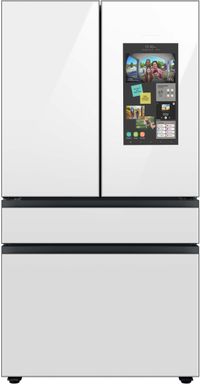
Shop this Samsung Refrigerator
With customizable panels and Samsung's Family Hub, this French door Samsung refrigerator provides extra storage space and smart home features. Owners love being able to personalize the look with different colored panels.
→ Learn more: The 5 Best French Door Refrigerators
Frigidaire Gallery® 21.5 Cu. Ft. Smudge-Proof® Stainless Steel Counter Depth French Door Refrigerator
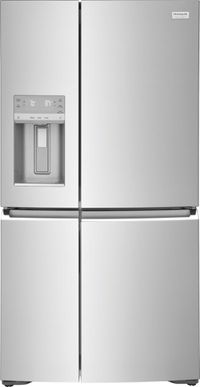
Shop this Frigidaire Refrigerator
Featuring Frigidaire's CrisperSeal technology to keep produce fresher longer, this counter-depth fridge also offers flexible organizers like the SpaceWise system. Reviewers praise the elegant look and consistent cooling.
Bosch® 800 Series 20.5 Cu. Ft. Stainless Steel Counter Depth French Door Refrigerator
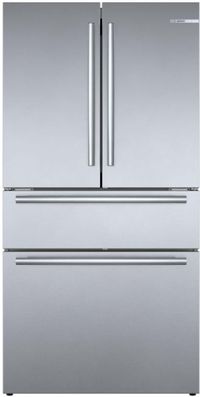
Bosch is known for high-quality appliances and this counter-depth French door model is just that. It uses their exclusive VitaFreshPro system to balance temperature and humidity within. The sleek stainless exterior of this Bosch refrigerator would complement any kitchen décor.
→ Learn more: What is a Counter Depth Refrigerator?
Amana® 24.6 Cu. Ft. Stainless Steel Side-By-Side Refrigerator
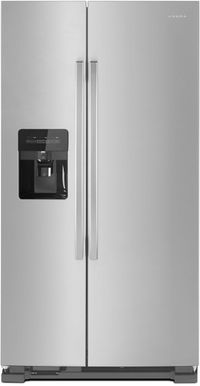
As the most affordable option on the list, this side-by-side refrigerator still packs useful features like a water dispenser and adjustable bins. Simple and no-frills, owners appreciate the dependability for the price.
Frigidaire Gallery® 30 in. 20.1 Cu. Ft. Black Stainless Steel Top Freezer Refrigerator
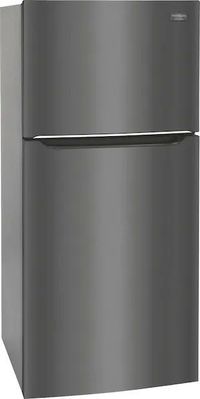
Shop this Frigidaire Gallery® Refrigerator
With a beautiful black stainless look, this top freezer refrigerator keeps foods organized on adjustable glass shelves. With innovative air circulation technology, it maintains consistent temperatures throughout the refrigerator, preventing hot spots and cold zones that can lead to premature spoilage.
Signature Kitchen Suite 25.6 Cu. Ft. Stainless Steel Built-In Side-By-Side Refrigerator
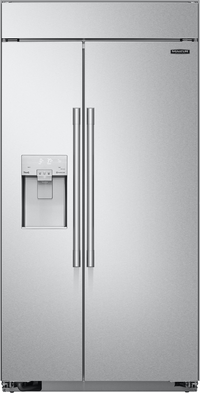
Shop this Signature Kitchen Suite Refrigerator
As one of the largest capacities, this built-in side-by-side option from Signature Kitchen Suite uses the SpacePlus ice system to maximize freezer space. Owners will enjoy the built-in integration and high-end finishes without reviews yet from this premium brand.
Thermador® Freedom® 19.6 Cu. Ft. Panel Ready Built-In Bottom Freezer Refrigerator
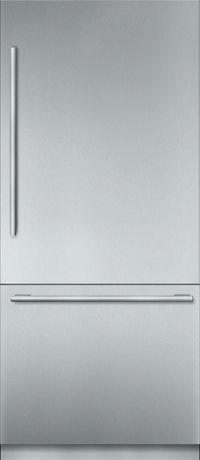
Shop this Thermador® Refrigerator
Thermador is known for innovation and construction quality, and this refrigerator stands true to that. The panel-ready design allows customization while features like the Cool Air Flow ensure long lasting food.
→ Learn more: Thermador Refrigerator Review
FAQ
How long does it take for food to spoil in the refrigerator?
Most foods will last 1-2 weeks in the refrigerator stored properly at 40°F or less. High-risk foods like meat and dairy can begin to spoil in 3-5 days. Fruits and vegetables often last 1-2 weeks while bread keeps for 5 days.
Will food spoil at 50 degrees in a refrigerator?
Yes, food may spoil faster at 50°F than the recommended 40°F or below. Bacteria grows rapidly between 40-140°F, so 50°F is considered in the danger zone. Refrigerators should maintain 35-38°F for optimal freshness.
How long can a fridge be off before food spoils?
An unplugged or non-functioning refrigerator will usually keep foods safe for about 4 hours if the door is left closed. After that, bacteria begins growing rapidly as contents warm. It's best to transfer perishables somewhere colder like another fridge or cooler with ice within 4 hours if power is lost to avoid power outage food spoilage.
Where to buy a new refrigerator near me?
If you are searching for a new refrigerator near Bellevue, WA, then you’ve found the right place! At Arnold’s Appliance, we stock a variety of refrigerators, including French door refrigerators and counter depth options. Explore refrigerators online or visit our store, today!
Why Trust Arnold’s Appliance?
Arnold's Appliance started in the summer of 1956 when it opened its doors as Lakeshore Appliance in Redmond, Washington. John Arnold and his family have since grown the store from just a few brands to the large appliance store it is today and moved to Bellevue in 1999 in search of a larger building. Arnold’s Appliance now offers high-end innovative products from over 45 manufacturers.
In addition to extensive product knowledge, Arnold’s has been providing fine appliances to Northwest builders, remodelers, designers, architects, and developers for over 47 years. Arnold's supplies products and installation to many of the finest custom and spec home builders in the Pacific Northwest. Along with single-family housing, Arnold's has also supplied products for some of the largest multi-unit projects in the area. Arnold’s, now the third generation of the Arnold Family, is dedicated to bringing the best quality products, delivery services, and installation to customers for years to come.
Shop Refrigerators at Arnold’s Appliance
Stop by Arnold’s Appliance Bellevue, WA location to see what a difference buying locally with an experienced staff can make. Or shop refrigerators online! Our friendly experts are always happy to help you find a refrigerator to prevent food spoilage — whether you call us at 425-454-7929, use our online chat feature, or visit us in person.
→ Learn more: 4 French Door Refrigerators Under $2000